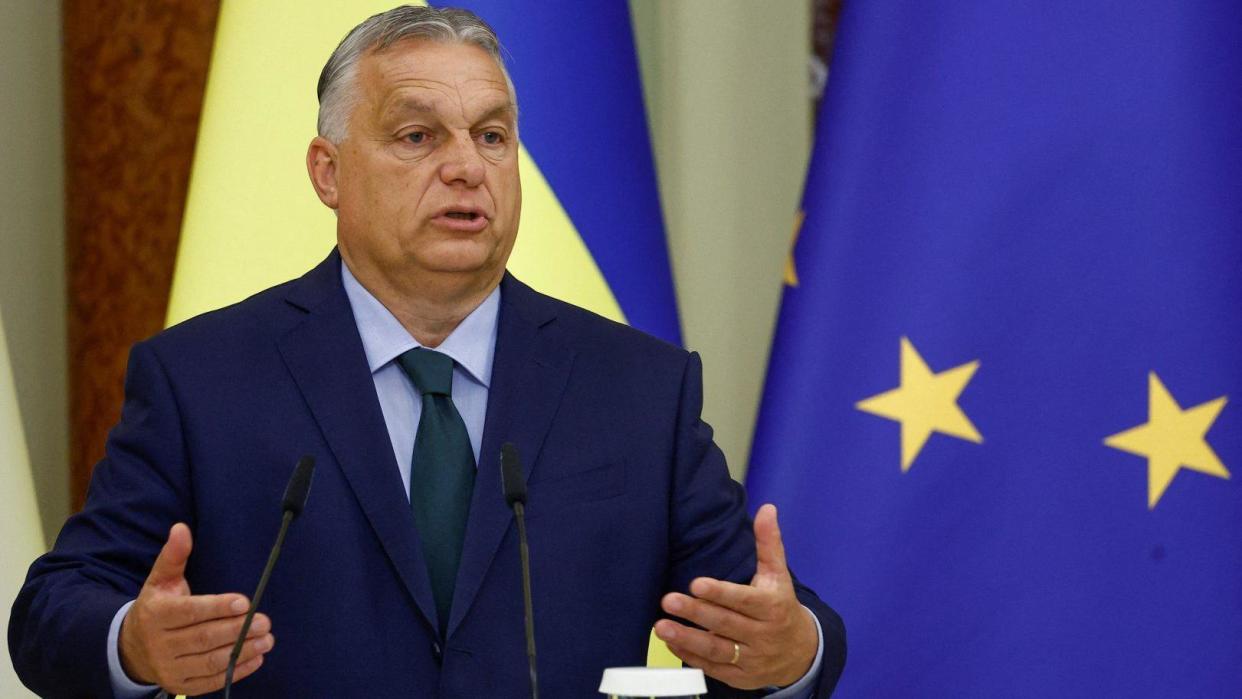Hungary's PM meets Putin for talks on Ukraine

Hungary's Prime Minister Viktor Orban has arrived in Moscow to meet Russian President Vladimir Putin for talks on the war in Ukraine.
The visit has been criticised by EU leaders, who have emphasised that Mr Orban is not acting on behalf of the bloc.
Mr Orban is the EU's only head of national government to have kept close ties to the Kremlin following its full-scale invasion of Ukraine in 2022.
He described the trip as a "peace mission" in a post on X. It comes days after he visited Kyiv.
In footage of the meeting, Mr Putin said the Hungarian prime minister was visiting "not just as a long-time partner" but as a European Union representative.
Hungary has just taken over the EU's rotating presidency, and will hold it to the end of the year.
Viktor Orban, speaking in the meeting, said: "Hungary will slowly become the last European country that can talk to everyone."
Some European leaders openly condemned the Moscow trip. Finland's Prime Minister Petteri Orpo called it "disturbing news", while Polish Prime Minister Donald Tusk tweeted: "The European Council is clear: Russia is the aggressor, Ukraine is the victim. No discussions about Ukraine can take place without Ukraine."
He went on: "The rumours about your visit to Moscow cannot be true, @PM_ViktorOrban, or can they?"
"Appeasement will not stop Putin," European Commission head Ursula von der Leyen wrote on X.
"Only unity and determination will pave the path to a comprehensive, just and lasting peace in Ukraine."
In a statement, High Representative of the EU for Foreign Affairs Josep Borrell said the trip "takes place, exclusively, in the framework of the bilateral relations between Hungary and Russia".
Russia's president told Mr Orban he would be happy to discuss "the nuances" of his recent Ukraine settlement plan, in which he offered talks if Ukraine pulled out of Russian-occupied regions.
The Kremlin leader voiced a number of tough pre-conditions for negotiations, but Kyiv and its Western allies say these would be tantamount to Ukraine's capitulation.
Earlier this week, Mr Orban visited Kyiv, saying "a quick ceasefire could be used to speed up peace negotiations".
Ukrainian President Volodymyr Zelensky - who has had frosty relations with Mr Orban - did not publicly respond to the proposal.
Many Ukrainians believe any ceasefire would simply cement Russia’s hold over territory it has seized from Ukraine and, if negotiations were to take place, they would prefer them to be conducted from a position of strength rather than on the back foot.
Mr Orban has been a vocal critic of Western support for Ukraine. He previously slowed agreement on a €50bn ($54bn; £42bn) EU aid package designed to support Ukraine in its defence against Russia.
Tuesday's visit to Kyiv was his first in 12 years, while he met Mr Putin repeatedly during that time.
During Mr Orban's joint appearance with Mr Zelensky, the body language between them was not warm, and neither took questions from the media after they gave their statements.
But for the next six months Mr Orban's position as head of the Council of the European Union means he has an influential role as a figurehead for Europe.
He came to Ukraine on his second day in that role for discussions, saying there was a need to solve previous disagreements and focus on the future.



